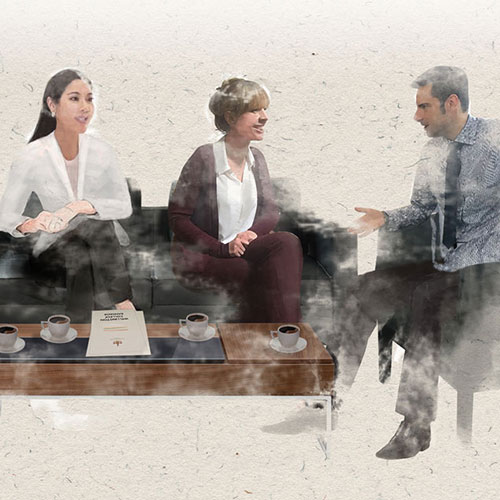
To consider parent-teacher-student relationships at various stages of a child’s education, Dr. Darika Lathapipat sat down with Christopher Nicholls, Master of Wellington College Bangkok, Katie Byrne, Head of Pre-Prep at Wellington College Bangkok, and Hannah Jeffs, Head of Wellington College Bangkok’s Junior School.
“Why should I let a teacher intrude?”
Aside from her role in education as President of Dhurakij Bundit University, Dr Darika was particularly interested in their viewpoints as her daughter enrolled at Wellington College Bangkok in August 2018.
DL So why should I let a teacher intrude into my relationship with my child?
CN (smiling) I remember asking that question when my son was young! Traditionally in the UK, there can be quite a frosty relationship between teacher and parent. Culturally, we are sometimes regarded as natural adversaries, in fact.
KB I guess I’m younger than you, Chris! I certainly never feel that way when I was at BST (British School in Tokyo); the parents were quite keen to work with us.
CN Well, the parents at BST are really supportive! In the UK, we use the legalistic Latin phrase ‘in loco parentis’ when we talk about our responsibility as teachers: we are ‘in the place of the parent’ when we carry out our work. – This implies that perhaps we should be doing a lot more than just teaching reading, giving out gold stars, etc.
HJ I agree. Our school Wellington College is historically a boarding school and, in that context, of course parents entrust their children to us for more than just day-to-day education: it’s in loco parentis at its fullest. The House Master and other boarding staff are absolutely key people in the lives of the students – not just as teachers but as ‘parents’. Beyond being a British international school offering education following the excellent framework of the UK national curriculum, the more a school – whether boarding or not – can work on that extra relationship, the better for the children in its care.
DL So how does this work in real life, then?
CN In her 2015 book ‘How to Raise an Adult’, Julie Lythcott-Haims studies a range of evidence from scientific research and concludes that there are some common things that good parents do. I would argue that, as partners in the process of bringing children up, teachers ought to look in the same direction. Some examples she gives are:
Sound advice for parents and teachers
- making the children do chores (the Japanese famously do this in school and, having lived and taught in Japan for years myself, I am a big fan of this practice);
- explicitly teaching, and reflecting on, social skills, such as making friends, helping others, listening and so on;
- setting high expectations;
- maintaining healthy relationships with each other (in a school, that’s between us teachers – at home, between husband and wife!);
- teaching mathematics early;
- not letting the child feel stressed;
- giving more credit for sincere effort and less for avoiding failure; and being authoritative, that is, teaching behaviour rationally rather than based on fixed cultural rules.
DL Hold on – without some stress, won’t a child just become lazy?
CN It depends what we mean by stress. Bad stress – where negative emotions seep in – is never a good thing. Some people say ‘it never did me any harm!’ – but that’s simply not true. While no one can be permanently in a state of happiness, what we all want is a better family life; to put it bluntly, negative stress always works against that ideal.
KB Being authoritative in the sense Julie use the term is a large part of what wellbeing is all about. I know this area of educational practice was developed at Wellington College in England, and it’s one of the things I admire about the school. Teaching and encouraging children and young people to think and take responsibility for themselves is such an empowering thing for us to do.
“I am a big fan of the wai khru ceremony”
HJ We are able to build on the best examples here in Bangkok, to ensure that the children feel safe and secure in their learning environment; teachers really can become an equal part in the nurturing process. Another focus is specific to Thai culture: I am a big fan of the wai khru ceremony, as something that strengthens the importance of the teacher-student relationship, which should be based on mutual respect and understanding.
DL Do you see a difference in how Thai parents approach education? And how does it affect your work?
HJ From my experience teaching at an international school in Bangkok, I see Thai parents support schools more and, in general, are far more respectful and trusting of teachers and their professionalism than in many other countries.
CN Having spoken with many Thai parents, I can see that – and it’ s really good news for us, and the children! The key thing in this positive environment is to harness the trust and create a really strong relationship, without intruding. We want children and parents to be happy at home and if we can make that happen, we should. That’s one reason why we include one hour of ‘homework’ time within the school day as the children get older: a classic source of passionate parent – child conflict is removed from home life!
DL How do you adjust your approach for working parents who, as much as they wish they could, are simply not able to attend every school event or parent-teacher meeting?
HJ The relationship does not have to be centred on formal meetings. Even just five minutes here and there for a quick exchange of emails or messages can serve a vital function. Communication is so easy these days and we can certainly use today’s technologies to everyone’s advantage. A parent who has expressed their concern, or asked their question, is a less worried parent. That in turn makes family life better. Win-win.
DL What are your ideal outcomes from a successful teacher-parent-student relationship?
KB I find what works best is an initial, deliberate getting-to-know-you phase. After that, everything is so much easier. As teachers, the best thing we can do in the early stages is listen. Parents, quite rightly, love to talk about their children! But that information is so valuable for us. Once a parent understands that our job is not to criticise, or stand in judgement, but rather to support and assist – and that we’re actually interested in them and their children as human beings, that’s the outcome right there.
“The best thing teachers can do… is listen”
HJ Communication, especially in the early years, is crucial and we like to keep parents as informed and involved as possible, to create a coalition for learning. Likewise, when a child has had a bad night’s sleep or is troubled by something at home, the parent needs to feel the teachers are aware of this to enable them to adapt their approach with the child. Communication to and from school is on and around every aspect of the child; this way, the transition between home and school life is fluid, the care and empathy seamless.
CN I often say to prospective parents that, when their phone buzzes with a message from school, I don’t want their first reaction to be ‘Oh no – what’s happened?!’ but rather ‘Oh good – a message from school!’
DL How should the relationship evolve as a child gets older? In Wellington’s case you will be seeing the children develop from toddlers all the way to teenagers and the cusp of adulthood.
CN It’s a bit of a myth that family and school life have to become unpleasant when a child becomes a teenager. It’s not an easy time for anyone but, if we continue to communicate, and we are clear, forgiving and (most importantly) self-aware and reflective, we can all help each other through. Human beings need attention from each other, but it doesn’t have to be negative attention. Knowing we genuinely have someone else’s support, whether we are a teacher, a parent or a child, is hugely reassuring.
HJ I completely agree, Chris. As a parent I was very nervous sending my eldest son to school. I worried they wouldn’t understand his complexities, get his sense of humour or know when he was tired. Thanks to a healthy relationship with the class teacher, though, we felt supported and knew she would do the best by our child. With this healthy partnership I felt everyone involved in my son’s life wanted the best for him and would strive to ensure he achieved. If we are aiming to be among the best international schools in Bangkok, surely this is the fundamental goal for all of us: to ensure our children succeed and are happy.
Thought Leadership at Wellington College, Bangkok












